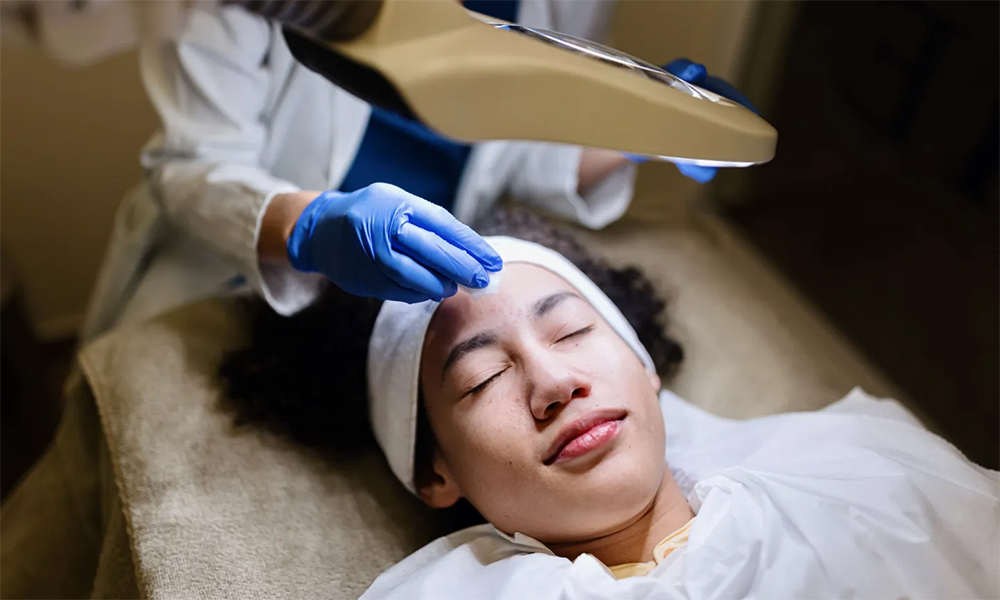
美國(guó)整形外科協(xié)會(huì)(American Society of Plastic Surgeons)的最新數(shù)據(jù)顯示,,2023年,13至19歲的青少年接受非手術(shù)醫(yī)美項(xiàng)目的數(shù)量突破26萬(wàn)例,。這表明許多家長(zhǎng)支持子女這樣做,。周一發(fā)布的密歇根大學(xué)醫(yī)學(xué)院C.S.莫特兒童醫(yī)院(University of Michigan Health C.S. Mott Children’s Hospital)全國(guó)兒童健康調(diào)查結(jié)果證明了家長(zhǎng)的態(tài)度轉(zhuǎn)變。
在989名青少年家長(zhǎng)中,,研究人員發(fā)現(xiàn),,六分之一的家長(zhǎng)認(rèn)為應(yīng)該允許青少年接受醫(yī)美項(xiàng)目,他們明確同意子女以任何理由接受皮膚填充,、化學(xué)煥膚,、激光脫毛、牙齒美白等項(xiàng)目,。
同時(shí),,有51%的家長(zhǎng)支持青少年在有正當(dāng)理由時(shí)接受非手術(shù)醫(yī)美項(xiàng)目,但他們對(duì)“正當(dāng)性”的標(biāo)準(zhǔn)存在差異,。有37%的家長(zhǎng)認(rèn)為,,通過(guò)醫(yī)美項(xiàng)目改善青少年的心理健康是一個(gè)合理的理由,有33%的家長(zhǎng)認(rèn)為,,特殊場(chǎng)合或容貌焦慮是正當(dāng)理由,。有30%的家長(zhǎng)認(rèn)為應(yīng)對(duì)霸凌是正當(dāng)理由。
在決定是否允許子女接受醫(yī)美項(xiàng)目時(shí),,家長(zhǎng)會(huì)考慮的重要因素包括機(jī)構(gòu)或項(xiàng)目的健康安全評(píng)級(jí)(76%),,兒童醫(yī)療保健提供者的建議或批準(zhǔn)(57%),以及青少年希望接受項(xiàng)目的理由(55%),。
家長(zhǎng)反對(duì)接受這類醫(yī)美項(xiàng)目最主要的原因包括:
? 感覺(jué)沒(méi)有必要(64%),,或擔(dān)心未來(lái)后悔(57%)
? 擔(dān)心子女提出這類要求表明存在自尊/心理健康問(wèn)題(55%)
? 成本問(wèn)題(52%)
? 子女會(huì)希望繼續(xù)接受醫(yī)美項(xiàng)目(49%)
? 感染或留疤風(fēng)險(xiǎn)(44%)
最后,關(guān)于非手術(shù)醫(yī)美項(xiàng)目的最低年齡限制,,家長(zhǎng)們的觀點(diǎn)如下:35%的家長(zhǎng)認(rèn)為最低年齡應(yīng)為18歲以上,;21%的家長(zhǎng)接受18歲門檻;27%的家長(zhǎng)認(rèn)可16至17歲,17%的家長(zhǎng)認(rèn)為15歲以下也可以接受非手術(shù)醫(yī)美項(xiàng)目,。
調(diào)查的共同負(fù)責(zé)人,、兒科醫(yī)生蘇珊·伍爾福德博士在新聞稿中指出,社交平臺(tái)上理想化的面容和身材,,使醫(yī)美項(xiàng)目日益流行,。她表示:“在自然情況下,無(wú)法達(dá)到社交平臺(tái)上經(jīng)過(guò)數(shù)字修飾的‘完美形象’,,這正在加劇青少年對(duì)自身容貌的不安全感,。當(dāng)孩子們將網(wǎng)絡(luò)點(diǎn)贊量等同于自我價(jià)值時(shí),問(wèn)題會(huì)變得更加嚴(yán)重,?!?/p>
她補(bǔ)充道,家長(zhǎng)需要引導(dǎo)孩子了解媒體制造的視覺(jué)幻象,,并審視他們改變外貌的真實(shí)動(dòng)機(jī),。
她表示:“當(dāng)孩子要求接受非手術(shù)醫(yī)美項(xiàng)目時(shí),家長(zhǎng)應(yīng)該考慮孩子的情感和心理健康問(wèn)題,?!?
她還強(qiáng)調(diào):“了解青少年對(duì)于醫(yī)美項(xiàng)目改變?nèi)菝驳目捶ǎ约八麄兿M@種改變?nèi)绾斡绊懰麄兩畹钠渌矫?,是有幫助的,。比如,有些孩子期待通過(guò)醫(yī)美項(xiàng)目迅速提升社交人氣,,或者交到更多朋友,。但改變外貌并不能保證實(shí)現(xiàn)預(yù)期的結(jié)果或者改變?nèi)松秤觥,!保ㄘ?cái)富中文網(wǎng))
譯者:劉進(jìn)龍
審校:汪皓
美國(guó)整形外科協(xié)會(huì)(American Society of Plastic Surgeons)的最新數(shù)據(jù)顯示,,2023年,13至19歲的青少年接受非手術(shù)醫(yī)美項(xiàng)目的數(shù)量突破26萬(wàn)例,。這表明許多家長(zhǎng)支持子女這樣做,。周一發(fā)布的密歇根大學(xué)醫(yī)學(xué)院C.S.莫特兒童醫(yī)院(University of Michigan Health C.S. Mott Children’s Hospital)全國(guó)兒童健康調(diào)查結(jié)果證明了家長(zhǎng)的態(tài)度轉(zhuǎn)變。
在989名青少年家長(zhǎng)中,,研究人員發(fā)現(xiàn),,六分之一的家長(zhǎng)認(rèn)為應(yīng)該允許青少年接受醫(yī)美項(xiàng)目,他們明確同意子女以任何理由接受皮膚填充,、化學(xué)煥膚,、激光脫毛、牙齒美白等項(xiàng)目,。
同時(shí),,有51%的家長(zhǎng)支持青少年在有正當(dāng)理由時(shí)接受非手術(shù)醫(yī)美項(xiàng)目,,但他們對(duì)“正當(dāng)性”的標(biāo)準(zhǔn)存在差異。有37%的家長(zhǎng)認(rèn)為,,通過(guò)醫(yī)美項(xiàng)目改善青少年的心理健康是一個(gè)合理的理由,,有33%的家長(zhǎng)認(rèn)為,特殊場(chǎng)合或容貌焦慮是正當(dāng)理由,。有30%的家長(zhǎng)認(rèn)為應(yīng)對(duì)霸凌是正當(dāng)理由。
在決定是否允許子女接受醫(yī)美項(xiàng)目時(shí),,家長(zhǎng)會(huì)考慮的重要因素包括機(jī)構(gòu)或項(xiàng)目的健康安全評(píng)級(jí)(76%),,兒童醫(yī)療保健提供者的建議或批準(zhǔn)(57%),以及青少年希望接受項(xiàng)目的理由(55%),。
家長(zhǎng)反對(duì)接受這類醫(yī)美項(xiàng)目最主要的原因包括:
? 感覺(jué)沒(méi)有必要(64%),,或擔(dān)心未來(lái)后悔(57%)
? 擔(dān)心子女提出這類要求表明存在自尊/心理健康問(wèn)題(55%)
? 成本問(wèn)題(52%)
? 子女會(huì)希望繼續(xù)接受醫(yī)美項(xiàng)目(49%)
? 感染或留疤風(fēng)險(xiǎn)(44%)
最后,關(guān)于非手術(shù)醫(yī)美項(xiàng)目的最低年齡限制,,家長(zhǎng)們的觀點(diǎn)如下:35%的家長(zhǎng)認(rèn)為最低年齡應(yīng)為18歲以上,;21%的家長(zhǎng)接受18歲門檻;27%的家長(zhǎng)認(rèn)可16至17歲,,17%的家長(zhǎng)認(rèn)為15歲以下也可以接受非手術(shù)醫(yī)美項(xiàng)目,。
調(diào)查的共同負(fù)責(zé)人、兒科醫(yī)生蘇珊·伍爾福德博士在新聞稿中指出,,社交平臺(tái)上理想化的面容和身材,,使醫(yī)美項(xiàng)目日益流行。她表示:“在自然情況下,,無(wú)法達(dá)到社交平臺(tái)上經(jīng)過(guò)數(shù)字修飾的‘完美形象’,,這正在加劇青少年對(duì)自身容貌的不安全感。當(dāng)孩子們將網(wǎng)絡(luò)點(diǎn)贊量等同于自我價(jià)值時(shí),,問(wèn)題會(huì)變得更加嚴(yán)重,。”
她補(bǔ)充道,,家長(zhǎng)需要引導(dǎo)孩子了解媒體制造的視覺(jué)幻象,,并審視他們改變外貌的真實(shí)動(dòng)機(jī)。
她表示:“當(dāng)孩子要求接受非手術(shù)醫(yī)美項(xiàng)目時(shí),,家長(zhǎng)應(yīng)該考慮孩子的情感和心理健康問(wèn)題,。”
她還強(qiáng)調(diào):“了解青少年對(duì)于醫(yī)美項(xiàng)目改變?nèi)菝驳目捶?,以及他們希望這種改變?nèi)绾斡绊懰麄兩畹钠渌矫?,是有幫助的。比如,,有些孩子期待通過(guò)醫(yī)美項(xiàng)目迅速提升社交人氣,,或者交到更多朋友,。但改變外貌并不能保證實(shí)現(xiàn)預(yù)期的結(jié)果或者改變?nèi)松秤觥,!保ㄘ?cái)富中文網(wǎng))
譯者:劉進(jìn)龍
審校:汪皓
Increasingly, teens age 13 to 19 are getting non-surgical cosmetic procedures—over 260,000 in 2023, according to the most recent data of the American Society of Plastic Surgeons. That suggests lots of approval from parents—something confirmed recently through a national sampling of parents through the University of Michigan Health C.S. Mott Children’s Hospital National Poll on Children’s Health, which released findings on Monday.
Through the survey of 989 parents of teens, researchers found that one in six believe teenagers should be allowed, with explicit parental approval and for any reason, to receive such aesthetic treatments—including derma fillers, chemical skin peels, laser hair removal, and teeth whitening.
Just over half of parents (51%), meanwhile, support teens getting non-surgical cosmetic procedures only if there’s a valid reason—though their beliefs differ about which reasons are valid. Getting a procedure to improve the teen’s mental health is something 37% view as a good reason, while 33% think that either a special occasion or feeling self-conscious is a valid reason. Being bullied is a valid reason according to 30% of parents polled.
Very important things to consider when making such a decision as a parent would include the health and safety ratings of the provider or procedure (76%), advice or approval from the child’s healthcare provider (57%), and their teen’s reason for wanting the procedure (55%).
Parents’ biggest reservations about approving such procedures would include:
? Feeling that their teen doesn’t need it (64%) or may have future regrets about it (57%)
? Concerns that such a request would indicate self-esteem or mental health problems (55%)
? The cost (52%)
? That their teen will want to continue getting procedures (49%)
? Risks of infection or scarring (44%)
Finally, regarding what the minimum age for non-surgical cosmetic procedures should be, parents had the following beliefs: 35% said anyone getting these procedures should be over 18; 21% said 18 should be the limit; 27% said 16 to 17 was old enough; and 17% said younger than 15 would be okay.
Dr. Susan Woolford, Mott Poll co-director and pediatrician, said in a news release that the increased popularity of such procedures may be due to social media’s idealized images of faces and bodies. “Teens are susceptible to feeling insecure about their appearance when compared to digitally altered pictures depicting an appearance that is probably unattainable naturally,” she said. “This problem is exacerbated by the pressure to post pictures of themselves to garner validation.”
Woolford added that it’s important for parents to find ways to help teens understand the distortions presented in the media and to also analyze their own reasons for wanting to change their appearance.
“If a teen asks for a non-surgical cosmetic procedure, parents should consider the emotional and mental health implications,” she said.
“It’s helpful to understand teens’ perceptions of how a procedure will change their appearance and the ways in which they hope it will impact other aspects of their life,” she added. “Some teens may view these procedures as a quick fix that will help them become more popular or gain friends for example. But changing your appearance doesn’t guarantee desired outcomes or that it will change your life.”






